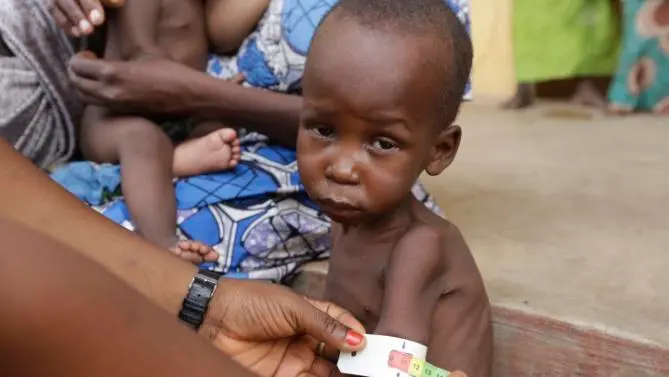THE United Nations has raised a fresh alarm over the worsening humanitarian situation in Nigeria, warning that 31 million Nigerians are food insecure, while more than 10 million children under the age of five are acutely malnourished, including 3.5 million suffering severe malnutrition.
The grim statistics were disclosed at a joint event held in Abuja on Tuesday by the Federal Government of Nigeria and the United Nations Office for the Coordination of Humanitarian Affairs (UNOCHA) to mark the 2025 World Humanitarian Day, themed “Strengthening Global Solidarity and Empowering Local Communities.”
Speaking at the event, the UN Resident and Humanitarian Coordinator for Nigeria, Mohamed Fall, warned that humanitarian needs in Nigeria are “escalating at an alarming rate,” with food insecurity and child malnutrition reaching critical levels.
“Currently, it is estimated that 31 million people are food insecure, over 10 million children under five are acutely malnourished, and 3.5 million face severe malnourishment,” Fall said.
He lamented that the commemoration comes amid a sharp decline in global solidarity for people in need, with international humanitarian financing grossly underfunded and humanitarian law often disregarded.
“The humanitarian community faces unprecedented challenges, with a growing global trend of self-interest undermining multilateralism,” he added.
Fall called for urgent reforms in the humanitarian system, stressing the need to empower local actors and ensure humanitarian responses are government-led, community-driven, and sustainable.
He urged a transition from dependence on international aid deliveries to locally led initiatives, saying:
“By the end of the transition period, the international community should focus on enabling local actors rather than direct aid delivery.”
Nigeria’s Minister of State for Humanitarian Affairs and Poverty Reduction, Dr. Tanko Sununu, underscored the government’s resolve to strengthen the humanitarian framework by increasing funding and ensuring accountability.
“The Government of Nigeria recognises the importance of linking humanitarian aid with development and peace initiatives,” Sununu stated.
“Therefore, government plans to increase funding for humanitarian interventions and establish a framework for accountability and transparency.”
Also speaking, the Head of UNOCHA in Nigeria, Trond Jensen, painted an alarming picture of collapsing food pipelines that once sustained millions of vulnerable Nigerians.
“Pipelines for food and nutrition that are lifelines for millions of people, especially children under the age of five, are severely disrupted, if not completely depleted,” Jensen said.
He added: “Millions of children are at risk of life-threatening Severe Acute Malnutrition (SAM). Urgent action is needed for about 400,000 SAM children, whose lives are in the balance if there is no immediate intervention.”
Both the Nigerian government and the UN paid tribute to humanitarian workers particularly national staff, who lost their lives while delivering aid to those affected by conflict and natural disasters.
Fall stressed that humanitarian operations in Nigeria must become more efficient, transparent, and accountable, while Sununu reiterated the government’s commitment to partnering with local and international organisations to alleviate suffering.
Angola is one of Africa’s top oil producers, yet nearly a third of Nigeria’s population of 230 million remains vulnerable to poverty, hunger, and malnutrition, according to the World Bank.
Aid agencies warn that unless swift and coordinated action is taken, the unfolding crisis could become one of the worst humanitarian disasters in decades.







